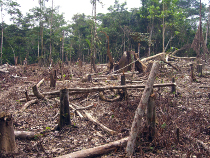Forest fires threaten deforestation reductions
Despite the reduction of deforestation in the Brazilian Amazon farmers are setting fires that could negate the progress that has been made

 Despite the reduction of deforestation in the Brazilian Amazon farmers are setting fires that could negate the progress that has been made. The UN-REDD (Reducing Emissions from Deforestation and Degradation) programme has been working towards reducing the carbon emissions related to deforestation worldwide since September 2008. Despite REDD progress a recent report from Science has brought to light unexpected activity that is hindering this success.
Despite the reduction of deforestation in the Brazilian Amazon farmers are setting fires that could negate the progress that has been made. The UN-REDD (Reducing Emissions from Deforestation and Degradation) programme has been working towards reducing the carbon emissions related to deforestation worldwide since September 2008. Despite REDD progress a recent report from Science has brought to light unexpected activity that is hindering this success.
REDD aims to reduce deforestation and gives financial benefit to those who comply. It has worked to protect forest areas from tree felling, logging, agricultural expansion and land degradation. However although more obvious deforestation has been lessened smaller fires still blaze. These fires are being used to maintain plots by clearing re-growth and adding nutrients to the soil. These small fires still release large amounts of carbon dioxide into the atmosphere; the report has established that between 1998 and 2007 fires increased 59 per cent in areas where deforestation has been reduced.
Luiz Aragao, the lead author of the study at the University of Exeter, UK claims that "This was a big surprise . . .We thought that fires would decrease with less deforestation." He questions therefore, whether similar fires are also being burnt in other tropical forests such as in Asia or the Congo Basin. These fires could jeopardise the long term success of REDD's aims to reduce deforestation.
It has been suggested that REDD now needs to focus on encouraging farmers to stop using fires to clear land. This would mean more financing would be necessary, as farmers would need modern machinery and training on how to use it. Andrew Mitchell, director of the Global Canopy Programme, said, "If we are to control deforestation, you have got to look at what local people are doing outside of the forests." Fire-free land management in areas near forests could reduce carbon emissions dramatically as it would prevent fire from affecting the forests.
Unless locals adopt an organised or no-fire policy then REDD's attempts at cutting deforestation will fail. The Science report's researchers believe that policy makers need to seriously consider the issue of fire and its connection to carbon emissions. They state that "The success of reductions in carbon emissions by avoiding deforestation depends on harmonising REDD with policies to limit fire incidence not only in the Brazilian Amazon but also in other rainforest nations in South America, Africa and Asia,"
Forest fires are one of the most evident ways to created forest degradation. It is imperative that these new findings are acted upon as these small, often undetectable fires are negating the successes of the REDD programme and any progress that has been made towards halting deforestation.
Author: Rachael Bristow | Climate Action
Image: Threat to Democracy | Flickr






